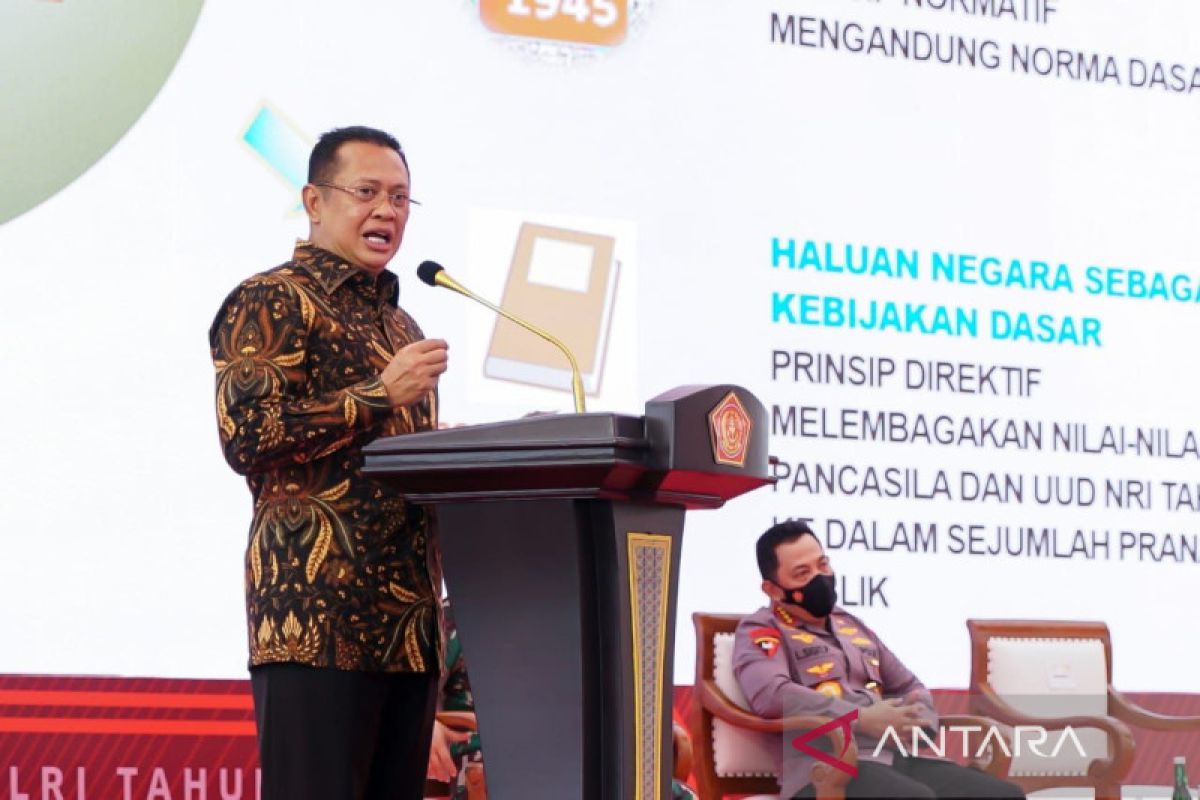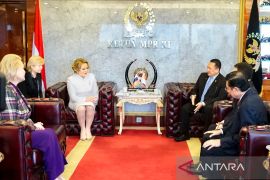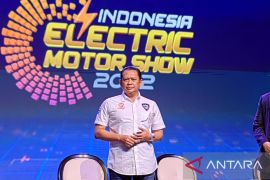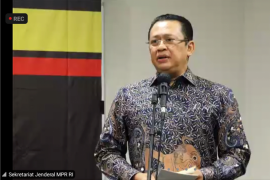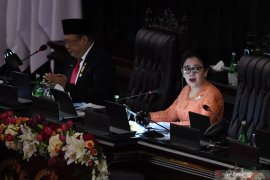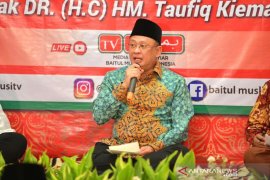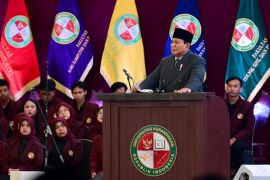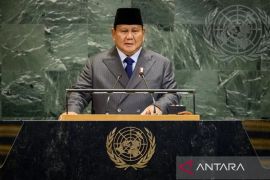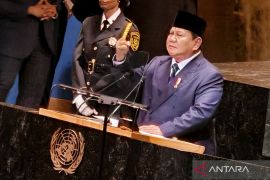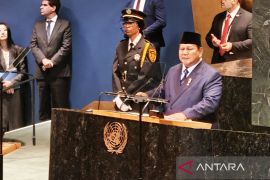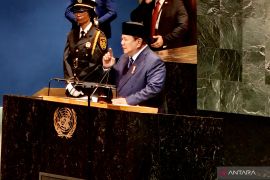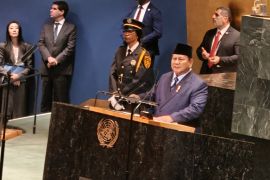This momentum needs to be (followed up thoroughly by everyone). I am optimistic that with the National Defense Force and Police Force fighting together with us, soon we will rise and get better.
In a global competition in which the fight for influence, market, and investment is fierce, it must be admitted that we are still less quick than other countries. Thus, there is no other choice left but for Indonesia to change.
The pandemic could be slowing the pace of economic growth. However, structural reforms to build an inclusive and sustainable economy must not cease.
The old, uncompetitive ways cannot continue. New strategies and innovations must be created. The economic structure, which has been dominated by household consumption, must be transformed into a more productive sector to encourage investment and exports. Investment must (encourage the creation of) new job opportunities that will benefit the Indonesian people.
It is not enough for Indonesia to just be better than before; but (the country) must be better than the others. In future, economic growth will be determined by the effectiveness of government policies in restoring the people's ability to purchase things and attract direct investment that has an impact on boosting employment opportunities.
If we fail to respond to these two challenges, it is very likely that the national economy will be (caught in) middle-income country (trap).
Merely possessing abundant natural resources is not enough. In fact, Indonesia, (despite) its abundant natural resource potential, has not been able to (independently) fulfill its (own) basic needs, such as food and medicine. It has become increasingly important to end the old economic paradigm that holds the principle of "randomly importing at low prices," or exporting raw materials.
Related news: Indonesia must summon courage to stop raw materials exports: President
Being trapped in that principle (had cost us dearly) the means to increase learning capabilities to cultivate and develop the added value of our potential resources.
Without efforts to grow and produce our own (items), with our own mastery of technology, we will lose economic sovereignty and continue to be dependent (on other countries). In the future, it must be ensured that movements in the motherland are not just "development in Indonesia," in which initiators may not be Indonesians or have no (love of Indonesia), with development results that can eliminate and alienate the nation itself.
What we should actively work on is "Indonesian development": development from, by, and for the Indonesian people, through processing and increasing the added value of Indonesian resources, with all (of) Indonesia's (mind), body, and soul.
This is where it is important for us to conduct structural reforms. For this purpose, (we need) science and technology that is able (to assist us in surpassing) other nations. We need superior human resources, who have (love for Indonesia), have noble character, and behold Pancasila as their ideology.
Indonesia needs human resources, who are able to turn an impossibility into an opportunity, turn weaknesses into strengths, and be able to increase the added value of each product produced.
(To meet these ends), it is important to realize that various policy and stimulus measures within the framework of the National Economic Recovery and Structural Reform, which will also become the main focus of fiscal policy in 2022, necessitate a conducive social and political climate.
This is where the National Defense Force and Police Force make a strategic contribution to create conditions, so that the socio-political dynamics remain within the boundaries of a healthy democratic corridor, and national development runs smoothly without any destructive (impacts).
Related news: Indonesia needs structural reform to realize 2045 vision: minister
Apart from health and economic issues, there are still many issues that we have to take seriously. The development of globalization, which is marked by the flow of communication and interaction that grows increasingly easier and (broader); (while) on one hand, we must be able to take advantage of it, but on the other hand, we must also be cautious of it.
Today, positive knowledge and experiences are much easier to obtain. However, at the same time, it also brings threats: to the Pancasila ideology; civilization, traditions, and cultural arts; as well as Indonesian local wisdoms (and) heritage.
The development and consolidation of national identity, so far, have not been fully successful in building (the) character of society and a social system rooted in the values of the Indonesian nation itself, which are distinctive, unique, modern, and superior.
The national identity is a positive synthesis between the noble values of the nation, such as religious values, togetherness and unity, tolerance, and universal modern values, which include work ethics and (the) principles of good, honest, and professional governance.
Democratic political life develops rapidly, especially in terms of holding general elections, presidential elections, and regional leader elections, as well as strengthening representative institutions. However, democracy has not yet provided optimal results within the framework of the intellectual life of the nation and the welfare of the people.
The rise of transactional politics erodes idealism and political commitment as a means of struggle to realize people's aspirations. The growing trend of identity politics and primordial sentiments in the general election contestation poses a threat to the future of democracy and national diversity.
Related news: Military, police officers must not meddle in democracy: President
In defense and security scopes, the dynamics of the global strategic environment (is replete) with competition and the struggle for influence from major countries, which have positioned Indonesia at the center of global interests. Should (we) be unprepared and not cautious, Indonesia could be destroyed in a global competition that knows no boundaries and time.
The combination of military and non-military threats has led to the birth of global geopolitical and geostrategic dilemmas, which are difficult to predict and anticipate.
Indonesia also (faces internal threats). (Among) the forms of disturbance are separatism, terrorism, communal conflict, radicalism, natural disasters, and border security issues.
Some other forms of disturbance are maritime security and transnational crimes.
Some of the (examples I have mentioned) show the range of problems faced by the Indonesian people.
This condition requires the Indonesian people, especially state administrators, political elites, and community leaders, to unite, work hard, and work together to (promote) development in all aspects of life to improve the dignity, worth, and welfare of the Indonesian people.
To overcome various problems faced by the Indonesian people, the People's Consultative Assembly sees the need for a road map, which provides (guidance) for all state administrators in realizing national ideals, as it has been written in the Preamble to the 1945 Constitution of the Republic of Indonesia.
The road map in question is to present the Main Principles of State Policy, which will be a reference or direction for planning, preparation, decisions, implementation, and evaluation of development policies by all state administrators.
Related news: Security disturbance may not be ignored: President
The establishment of the Unitary State of the Republic of Indonesia, as stated in the Preamble to the 1945 Constitution of the Republic of Indonesia, is to protect (the) Indonesian nation, as a whole and entire Indonesia homeland, and to promote public welfare, educate the nation, and participate in implementing world order based on independence, eternal peace, and social justice in an effort to realize an independent, united, sovereign, just, and prosperous country.
These great ideals are all-time goals that must always be pursued in a sustainable manner by the government, and synergy among all stakeholders (is required), both at the central and regional levels.
Efforts to realize these national goals must rely on three fundamental consensuses of the Indonesian nation, those being Pancasila as the basis and ideology of the state, the 1945 Constitution of the Republic of Indonesia as the basic law or norm, and the state policy as the basic policy.
While Pancasila contains philosophical principles, the 1945 Constitution of the Republic of Indonesia contains normative principles. Thus, the state policy contains directive principles that will serve as a reference in the preparation of development policies.
The values (contained within) Pancasila are still abstract; (while) the articles of the Constitution also mostly contain basic norms that do not provide direction on how to institutionalize them.
Learning from past experiences, by considering the amendments to the 1945 Constitution of the Republic of Indonesia, it is necessary to have state directives as a guide to the social, national, and state life on how to institutionalize the values of Pancasila and the 1945 Constitution of the Republic of Indonesia in a number of public institutions, which can provide guidance on implementation of a comprehensive, targeted, integrated, and sustainable development, with emphasis on quality growth that increases income distribution and employment as well as equitable participation in development, (encompassing) participation in implementing development, in accountability for the implementation of development, as well as in enjoying the development results.
Related news: Pancasila should become guideline in policy formulation: BPIP
The existence of the state policy, at least in (its raw state), can make national development rediscover its spirit and identity as confirmed in the Preamble to the 1945 Constitution of the Republic of Indonesia. The guiding principles of the State, which are directive in nature, have the functions of:
1. Ensuring that there is one guideline or direction for (everyone) to affirm the main ideas of the 1945 Constitution of the Republic of Indonesia as mandated by the founding fathers of the nation, (as) described in the original text of the explanation of the 1945 Constitution of the Republic of Indonesia in the life of the nation and state;
2. Ensuring the existence of a guideline or direction that guarantees the continuity of the Vision and Mission of the Republic of Indonesia as stated in the Preamble to the 1945 Constitution of the Republic of Indonesia in the face of globalization and the development of science and technology for the central and regional governments;
3. Ensuring the existence of a clear guideline or direction in the planning, preparation, (decision-making process), implementation, and evaluation of national development in all fields of life (political, economic, social, cultural, as well as mental and spiritual), which ensures synergy, integration, and sustainability (in) central and regional development, which does not depend on the electoral moment;
4. Reinforcing the presidential system in the era of decentralization as well as ensuring the continuity of a constitutional, strong and stable, and authoritative national leadership; and
5. Reinforcing the integration of the nation in the spirit of unity and integrity, which is based on Pancasila and the 1945 Constitution of the Republic of Indonesia within the Unitary State of the Republic of Indonesia, which is Bhinneka Tunggal Ika.
With reference to this rationale, it is necessary to formulate a direction for the administration of the state in the form of the Principles of State Policy, which contains a comprehensive conception of state administration to build the order of the social, national, and state life, and to (encourage) progress in all scopes, which place Indonesia at an equal position as other nations in the world.
In the conception of structural reforms aimed at transforming Indonesia's defense, of course, (it) requires a long-term sustainable political commitment to defense. I, as chair of the People's Consultative Assembly, academically offer the imposition of the Main Principles of State Policy to ensure the sustainability of the nation's strategic programs, including the transformation of defense towards the formation of the Indonesian Defense Force in 2045, (in order to) obtain a solid formal legal framework.
Obviously, this academic opinion must be studied in-depth to ensure that the implementation of the guidelines of state policy will strengthen Indonesia as a democratic country that is supported by the existence of a formidable defense force.
*) Bambang Soesatyo, Chairman of People's Consultative Assembly
Editor: Suharto
Copyright © ANTARA 2022
